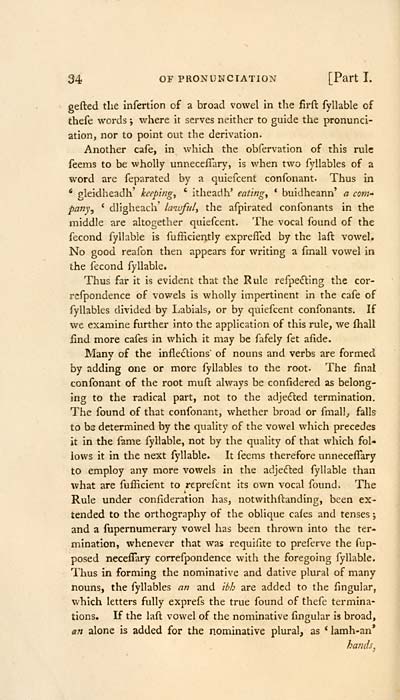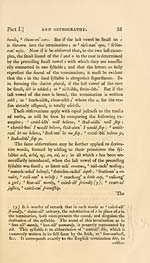Download files
Complete book:
Individual page:
Thumbnail gallery: Grid view | List view

34 OF PRONUNCIATION [Part I.
gefted the infertion of a broad vowel in the firft fyllable of
thefe words j where it serves neither to guide the pronunci-
ation, nor to point out the derivation.
Another cafe, in which the obfervation of this rule
feems to be wholly unneceflary, is when two fyllables of a
word are feparated by a quiefcent confonant. Thus in
* gleidheadh' keepings ' itheadh' eating, * buidheann' a com-
pany, ' dligheach' laivful, the afpirated confonants in the
middle are altogether quiefcent. The vocal found of the
fecond fyllable is fufHciently exprefled by the laft vowel.
No good reafon then appears for writing a fmall vowel in
the fecond fyllable.
Thus far it is evident that the Rule rcfpecSting the cor-
rcfpondence of vowels is wholly impertinent in the cafe of
fyllables divided by Labials, or by quiefcent confonants. If
we examine further into the application of this rule, we fhall
find more cafes in which it may be fafely fet afide.
Many of the inflections" of nouns and verbs are formed
by adding one or more fyllables to the root. The final
confonant of the root muft always be confidered as belong-
ing to the radical part, not to the adjected termination.
The found of that confonant, whether broad or fmall;, falls
to be determined by the quality of the vowel which precedes
it in the fame fyllable, not by the quality of that which fol-
lows it in the next fyllable. It feems therefore unnecefiary
to employ any more vowels in the adjedled fyllable than
what are fufficient to reprefent its own vocal found. The
Rule under confideration has, notwithftanding, been ex-
tended to the orthography of the oblique cafes and tenses ;
and a fupernumerary vowel has been thrown into the ter-
mination, whenever that was requiilte to preferve the fup-
posed neceflary correfpondence with the foregoing fyllable.
Thus in forming the nominative and dative plural of many
nouns, the fyllables an and ibh are added to the Angular,
which letters fully exprefs the true found of thefe termina-
tions. If the laft vowel of the nominative Angular is broad,
en alone is added for the nominative plural, as *lamh-an*
hands.
gefted the infertion of a broad vowel in the firft fyllable of
thefe words j where it serves neither to guide the pronunci-
ation, nor to point out the derivation.
Another cafe, in which the obfervation of this rule
feems to be wholly unneceflary, is when two fyllables of a
word are feparated by a quiefcent confonant. Thus in
* gleidheadh' keepings ' itheadh' eating, * buidheann' a com-
pany, ' dligheach' laivful, the afpirated confonants in the
middle are altogether quiefcent. The vocal found of the
fecond fyllable is fufHciently exprefled by the laft vowel.
No good reafon then appears for writing a fmall vowel in
the fecond fyllable.
Thus far it is evident that the Rule rcfpecSting the cor-
rcfpondence of vowels is wholly impertinent in the cafe of
fyllables divided by Labials, or by quiefcent confonants. If
we examine further into the application of this rule, we fhall
find more cafes in which it may be fafely fet afide.
Many of the inflections" of nouns and verbs are formed
by adding one or more fyllables to the root. The final
confonant of the root muft always be confidered as belong-
ing to the radical part, not to the adjected termination.
The found of that confonant, whether broad or fmall;, falls
to be determined by the quality of the vowel which precedes
it in the fame fyllable, not by the quality of that which fol-
lows it in the next fyllable. It feems therefore unnecefiary
to employ any more vowels in the adjedled fyllable than
what are fufficient to reprefent its own vocal found. The
Rule under confideration has, notwithftanding, been ex-
tended to the orthography of the oblique cafes and tenses ;
and a fupernumerary vowel has been thrown into the ter-
mination, whenever that was requiilte to preferve the fup-
posed neceflary correfpondence with the foregoing fyllable.
Thus in forming the nominative and dative plural of many
nouns, the fyllables an and ibh are added to the Angular,
which letters fully exprefs the true found of thefe termina-
tions. If the laft vowel of the nominative Angular is broad,
en alone is added for the nominative plural, as *lamh-an*
hands.
Set display mode to: Large image | Transcription
Images and transcriptions on this page, including medium image downloads, may be used under the Creative Commons Attribution 4.0 International Licence unless otherwise stated. ![]()
| Early Gaelic Book Collections > Blair Collection > Elements of Gaelic grammar > (64) |
|---|
| Permanent URL | https://digital.nls.uk/79040743 |
|---|
| Description | A selection of books from a collection of more than 500 titles, mostly on religious and literary topics. Also includes some material dealing with other Celtic languages and societies. Collection created towards the end of the 19th century by Lady Evelyn Stewart Murray. |
|---|
| Description | Selected items from five 'Special and Named Printed Collections'. Includes books in Gaelic and other Celtic languages, works about the Gaels, their languages, literature, culture and history. |
|---|

